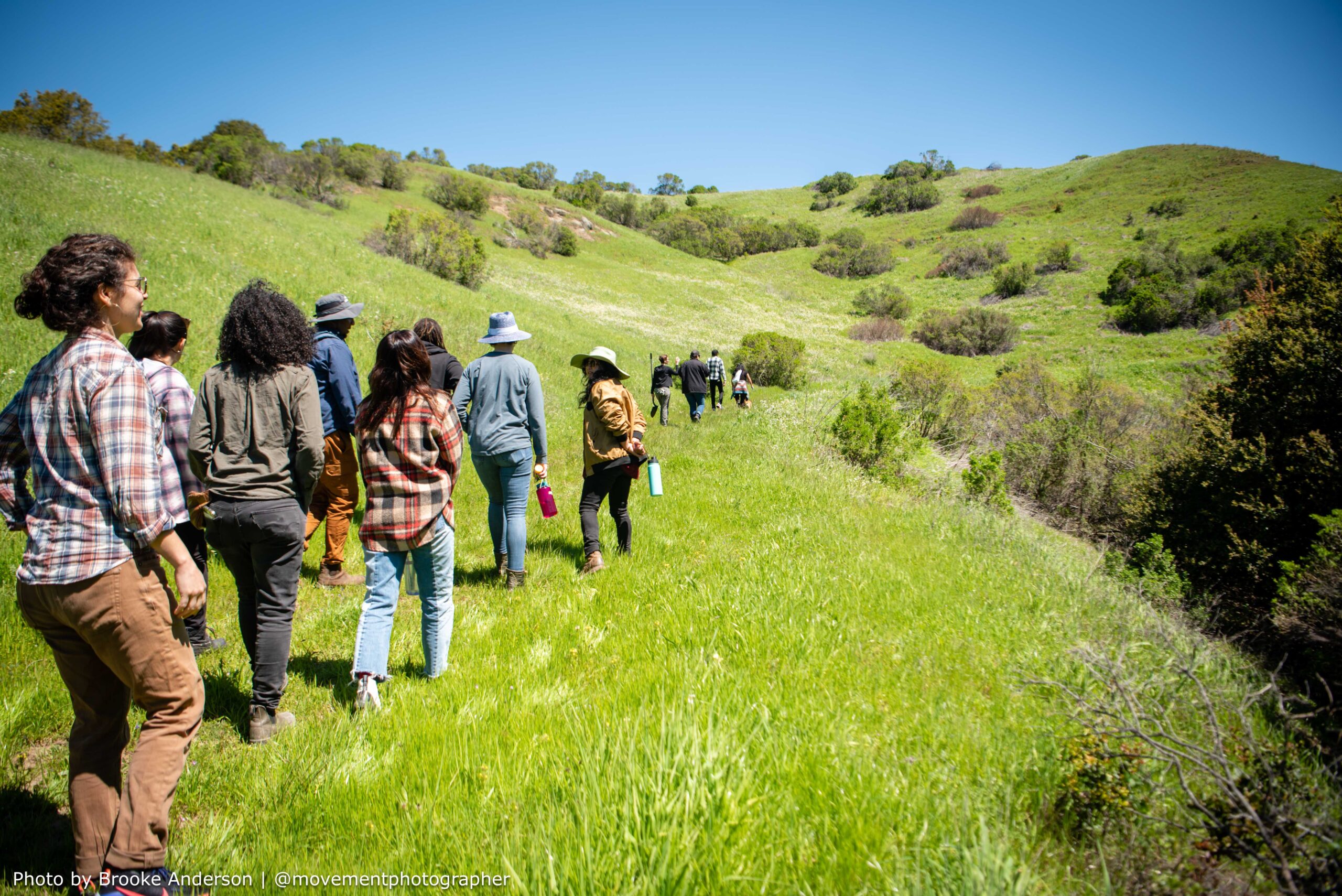
Shot from behind of a group of people walking on a green hilly landscape with a blue sky overhead. Photo: Brooke Anderson
By Quinton Sankofa
“Free the land” is a phrase used by the New Afrikan Independence Movement as a call for an independent Black nation on the North American continent. Movement Generation honors the origins and significance of this call to action and supports all forms of Black land reparations. We uplift and practice solidarity with groups like Malcolm X Grassroots Movement (MXGM), one of the organizations continuing the legacy of the New Afrikan Independence Movement to free the land and free the people.
At Movement Generation, our mission is to inspire and engage people in the movement for ecological justice, and we do this by carrying forth the visions and strategies of our ancestors and movement elders. As an organization with diverse and experienced Black and Indigenous leadership, we draw from the visions of the likes of Malcolm X, the Black Panther Party, The Republic of New Afrika, American Indian Movement, Leonard Peltier, Winona LaDuke, and many more. We see our land liberation work as flowing within the same rivers as other Black-, Indigenous-, and people of color-led movements to restore our relationships with land.
And MG recognizes that people of African descent in particular have a unique struggle in reimagining and reclaiming our relationships with the land of this continent; and doing so in ways that honor our ancestors from the African continent, our enslaved ancestors, and Indigenous peoples of Turtle Island.
In 2015, Movement Generation started a conversation with Black comrades about how we, as a multiracial organization, could support Black-led movements. The answer was to center the Black experience and organize with Black people. They said, “Do what you do, but for Black people specifically.” And so we did that. We created the Black Land Liberation Initiative (BLLI) with Blackout Collective. We worked with Black organizers to include land and land-based reparations as imperatives to our fight for ecological justice. After helping to launch and guide BLLI for two years, Movement Generation stepped back to let it shine through the work of Blackout Collective and the Center for Third World Organizing, because we knew that in the long run BLLI needed to be led by all-Black organizations.
Now, Movement Generation has launched our own land project. After years of talking about land reparations and Indigenous sovereignty, we took a huge step in pursuing it in our own way. We did this in partnership with Sogorea Te’ Land Trust, an urban Indigenous women-led nonprofit rooted here in the San Francisco East Bay where we call home. We organized funders to redistribute wealth so that we could purchase 43 acres that had been stolen from Bay Miwok people through the Homestead Act of 1862, and we returned that land to Indigenous care. In solidarity, Sogorea Te’ worked with us to develop agreements for MG to base our work here long term.
Now that we have liberated this land and secured a land base for our organization, our next step is to develop a space here that will specifically benefit Black and Indigenous communities that are impacted by climate disruption and the ecological crisis. The Justice & Ecology Center is a vision in its earliest stages. We want it to be a healing space, a gathering space, and an ecosystem where we grow food and medicine together in ways that make our ancestors and future generations proud! We see it as a place where we nourish the land, a place where we reclaim energy and water sovereignty so we can meet our own needs.
Creating spaces like this is part of a larger vision and action for land-based revolutions everywhere. This is how we begin to create liberated futures for the land, for Black people, for Indigenous peoples, for all peoples. We need land liberated everywhere. It needs to happen in the South where more than half of all Black people in this country live. It needs to happen in the cities where Black people and migrants have come to make home. It needs to happen on Indigenous land all over this continent.
Land reparations can look so many different ways, and achieved through many different strategies. When we say “free the land”, we mean free it all. And as El Hajj Malik El Shabazz (aka Malcolm X) says: “By any means necessary!”
Here are some resources:
New Afrikan Independence Movement Declaration of Independence
Free the Land: The Republic of New Afrika and the Pursuit of a Black Nation-State – By Edward Onaci

